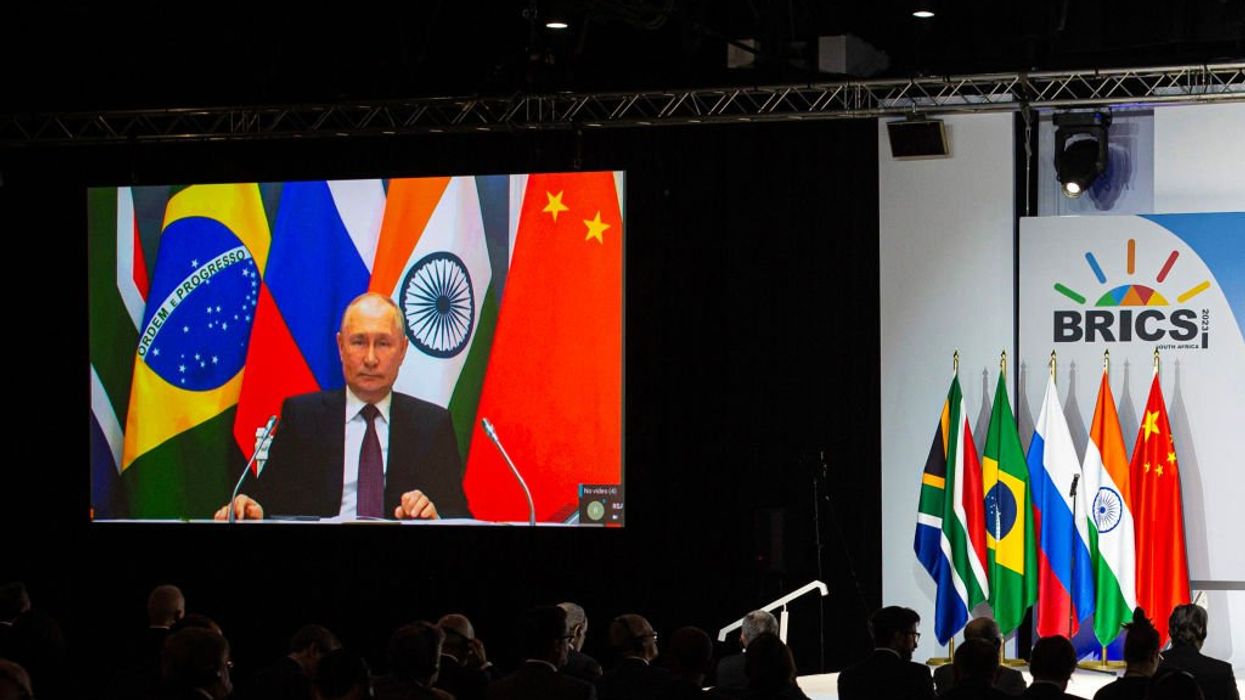
Per-Anders Pettersson/Getty Images

The yearly BRICS conference wrapped up with a major announcement. The group has put out invitations to more than double its size as of January 2024. These invites went to Saudi Arabia, Iran, and the UAE, as well as Argentina, Ethiopia, and Egypt.
This increases collaboration among major oil producers and exporters, as well as powerful countries both friendly and unfriendly to the West. It also spells trouble for the U.S. dollar in return.
BRICS, an acronym for Brazil, Russia, India, China, and South Africa, originally an idea from a Goldman Sachs research paper, turned into an institution around the time of the great recession financial crisis. These emerging nations came together to forge alliances to compete with traditional Western alliances. The BRICS nations also aim to work together to give themselves more power and a voice in the global economic and political landscape.
The BRICS countries have been seeking ways to end the U.S.’ reign as the global financial superpower. So it is not surprising that BRICS would seek, among its slate of efforts, to try to lessen member countries' dependence on the U.S. dollar.
This expansion is certainly heavily influenced and engineered by China to shore up stability in its oil imports and to create more resistance to U.S. dollar hegemony.
While the dollar has been the world’s global reserve currency for nearly eight decades, oil is in many ways the world’s true global currency. With the world consuming nearly 100 million barrels of oil every single day, and with more than 6,000 products that impact every part of our lives derived from oil, it truly powers the globe.
As I covered in my book, "You Will Own Nothing," after the U.S. went off the gold standard, with the dollar as the pre-eminent global currency, oil around the world was priced in dollars. In 1974, Saudi Arabia was the largest producer of oil and and de facto head of the Arab oil-exporting countries. The U.S. and Saudi Arabia made what was heralded as a “milestone pact.” Among the points was that the U.S. would support the Saudis militarily and the Saudis would plow their excess U.S. dollars from oil exporting (“petrodollars”) back into U.S. Treasury bonds.
With oil priced in U.S. dollars and substantial demand for oil, as well as the excess U.S. dollars being plowed back into Treasurys by pact, there was naturally massive demand for dollars that ultimately provided cheap financing to the U.S., including to the U.S. government for its massive expansion.
Today, with the U.S. and other nations desiring to move away from traditional fossil fuels and the BRICS nations doubling down on fossil fuels and seeking to trade more in their local currencies (perhaps with some loose backing from gold), that could cause a drop in demand for U.S. dollars and create more inflationary pressures and higher capital costs that would put pressure on economic growth in the U.S.
Not to mention that many of these BRICS nations, both existing and those set to join, have significant rare earth mineral deposits and other raw materials needed for the West’s “green” push.
The BRICS expansion also potentially gives China and BRICS more money for their New Development Bank, which is meant as a competitor to the World Bank and the IMF, seeking to invest in (and sink their proverbial teeth into) developing countries around the world.
It’s clear that China is seeking, with the help of other big, natural resource-rich nations, to disrupt the U.S.' power position, economically and otherwise.
The Biden administration’s and other Western alliance powers’ policies are a recipe for slow economic suicide. This expanding alliance should be a loud wake-up call.Carol Roth
Contributor